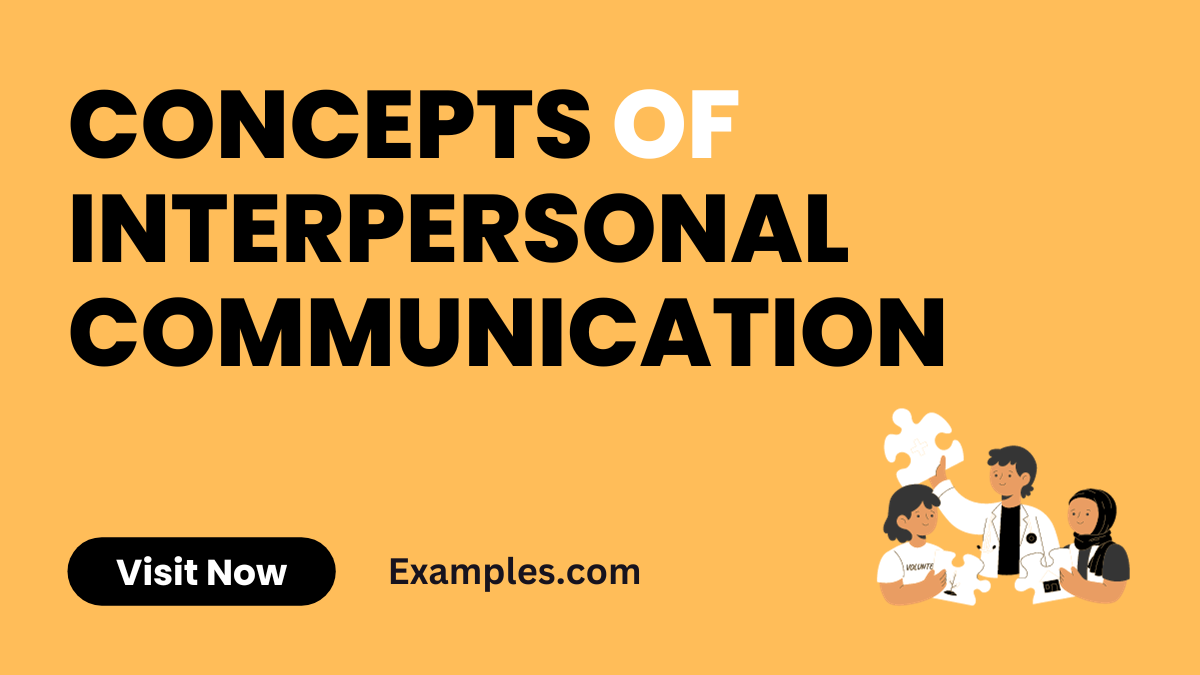Concepts of Interpersonal Communication
Explore the intricate world of interpersonal communication with our comprehensive guide, enriched with practical interpersonal communication examples. This guide delves into the core concepts that shape effective communication, from verbal and non-verbal cues to emotional intelligence. Through real-life scenarios and examples, we illustrate how these concepts manifest in everyday interactions, providing valuable insights for anyone looking to enhance their communication skills in personal and professional settings.
What are the Concepts of Interpersonal Communication? – Definition
The concepts of interpersonal communication involve the key principles and techniques used in exchanging information and emotions between individuals. These concepts include active listening, where you fully concentrate on and understand what someone is saying, and empathetic engagement, where you connect with the feelings of others. They also cover verbal and non-verbal communication, which are about how we use words, tone, body language, and facial expressions to convey messages. Understanding these concepts is crucial for effective and meaningful interactions in both personal and professional settings.
Five Concepts of Interpersonal Communication
In the realm of interpersonal communication, there are five essential concepts that play a pivotal role in successful interactions. Understanding and mastering these concepts can lead to more effective and enriching communication, essential in both personal and professional contexts. This guide highlights these five key concepts, each serving as a cornerstone for building strong and meaningful connections.
- Active Listening: More than just hearing, this involves fully engaging with the speaker, crucial for listening in interpersonal communication. It’s about understanding both the words and the emotions behind them.
- Verbal Communication: Effective use of language and words forms the basis of verbal communication in interpersonal communication. It’s not just what is said, but how it’s said.
- Non-Verbal Communication: Body language, facial expressions, and gestures play a significant role in non-verbal communication in interpersonal communication. These cues can often convey more than words.
- Feedback: Giving and receiving constructive feedback is essential in refining interpersonal communication skills. It helps in mutual understanding and growth.
- Empathy: The ability to understand and share the feelings of others is a fundamental element of emotional expression in interpersonal communication. It builds trust and strengthens connections.
Key Concepts of Interpersonal Communication

The key concepts of interpersonal communication encompass fundamental principles that guide how we interact with others. These concepts are crucial in shaping our approach to communication and greatly influence the effectiveness of our interactions. In this section, we will explore these key concepts, providing insight into their significance and application in everyday communication scenarios.
- Context: The environment or situation where communication occurs shapes the interaction. Whether it’s in a professional setting or a personal conversation, context influences the communication style and content.
- Perception: How individuals perceive themselves and others greatly impacts communication. Perceptions affect interpretations and reactions to messages.
- Cultural Differences: Acknowledging and adapting to cultural variances in communication is vital in today’s global society. Cultural sensitivity enriches interpersonal interactions.
- Conflict Resolution: Effectively managing and resolving disputes is a critical aspect of communication, especially in maintaining healthy relationships.
- Relationship Dynamics: The nature of the relationship between communicators influences the communication style and approach. Different dynamics require different communication strategies.
Basic Concepts of Interpersonal Communication

Understanding the basic concepts of interpersonal communication is essential for anyone looking to improve their communication skills. These concepts form the foundation of how we connect and engage with others. This guide will outline these basic concepts, offering a starting point for those seeking to enhance their interpersonal communication abilities in various settings, from personal relationships to professional environments.
- Encoding and Decoding: This involves the sender creating a message (encoding) and the receiver interpreting it (decoding). Effective communication requires clarity in both processes.
- Channel Selection: Choosing the right medium (face-to-face, digital, written) is crucial. Each channel has its nuances and is suitable for different types of messages.
- Message Construction: Crafting messages that are clear, concise, and appropriate for the audience is fundamental. This involves considering the content, tone, and purpose of the message.
- Listening and Understanding: Effective communication is not just about speaking but also about listening and understanding the other party’s perspective.
- Feedback Loop: A continuous process where communicators provide responses to each other’s messages. This loop is essential for ensuring mutual understanding and effective ongoing communication.
Cultural awareness is another critical dimension of effective communication. It involves recognizing and respecting the different beliefs, values, and customs based on a person’s origins. This awareness facilitates more successful personal and professional relationships in a diverse environment. Subtle actions, such as the way one accepts items or greets others, can significantly impact interpersonal interactions. Being culturally aware means understanding these nuances and acting accordingly to communicate respect and understanding. For instance, in some cultures, certain gestures or greetings, which might seem unusual to others, are standard practices and hold significant value. Leaders and organizations that embrace cultural awareness, like Google, demonstrate its impact on efficiency and workplace harmony. For a detailed exploration of how cultural awareness enhances effective communication, Stevenson University provides insightful perspectives.
In conclusion, this guide on Concepts of Interpersonal Communication provides essential insights into the fundamental principles of effective communication. From active listening to understanding cultural nuances, these concepts are vital for anyone seeking to enhance their communication skills. By applying these guidelines and tips, you can significantly improve your interactions, leading to more successful and meaningful connections in both your personal and professional life.



